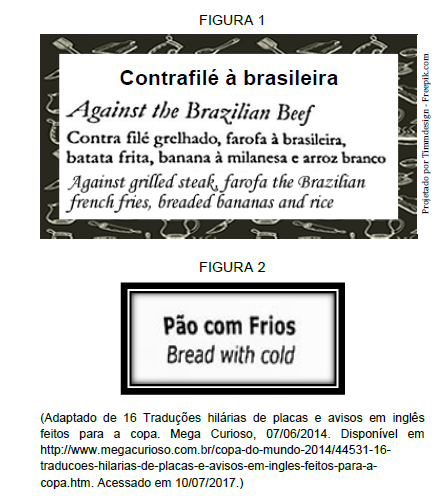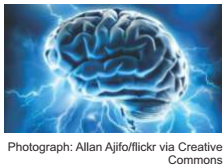Questões de Vestibular
Comentadas sobre verbos | verbs em inglês
Foram encontradas 20 questões

Text
Volunteering is fun!



Disponível em: https://learnenglishteens.britishcouncil.org/magazine/life-around-world/volunteering-fun. Texto
adaptado. Acesso em: ago. 2020.
Had the Earth been flat, a total of three satellites would have been enough to provide this information (l. 30-31)
In relation to the rest of the statement, the underlined fragment has the objective of:
Leia o texto para responder à questão.
There is nothing conventional about 17-year-old Michael Fuller’s relationship with music. As someone with high-functioning autism who sees the world through sound, creating melodies from the bustle of the high street or trains on the tracks feels more natural than any social interaction. This hardwired connection to sound has been with him for as long as he can remember.
By the age of 11, Michael could play Mozart by ear, having taught himself to play the piano through a mobile phone app. The app highlighted notes on a keyboard as classical music played. He describes his unusual musical talent as “downloading” music into his head. His mother, Nadine, remembers that as a child Michael would “suddenly pop up and say: ‘I’ve got a symphony’”. Michael took to the piano and found he could quickly perform complex pieces from memory.
“I liked what I was hearing, sought more music and began studying through Google and YouTube,” he remembers. “It was very organic. I would listen in great depth and the music would be implanted in my mind. I could then just play it on the piano – all without being taught.”
Growing up in a family that listened to reggae over classical music, Michael feels “very much aware” of how different his approach is to music – symbolised by the way he taught himself piano as a child. This, his mother says, came as a “surprise to the family and myself – I’d never listened to classical music in my life”.
It was not long after learning to play the piano that Michael started composing his own works. Describing this process as “making music with my mind”, Michael says composing classical symphonies “helps me to express myself through music – it makes me calm”. Michael wants to nurture his song writing to achieve his ambition of becoming a modern mainstream classical artist. He wants to control the creative process, unlike typical modern-day composers, who he says “write blobs on a page, hand it over to the musicians – then say bye-bye and stay in the background and get no recognition”. Instead, Michael is determined to take centre stage.
(Alex Taylor. www.bbc.com, 27.03.2018. Adaptado.)

In today’s political climate, it sometimes feels like we can’t even agree on basic facts. We bombard each other with statistics and figures, hoping that more data will make a difference. A progressive person might show you the same climate change graphs over and over while a conservative person might point to the trillions of dollars of growing national debt. We’re left wondering, “Why can’t they just see? It’s so obvious!”
Certain myths are so pervasive that no matter how many experts disprove them, they only seem to grow in popularity. There’s no shortage of serious studies showing no link between autism and vaccines, for example, but these are no match for an emotional appeal to parents worried for their young children.
Tali Sharot, a cognitive neuroscientist at University College London, studies how our minds work and how we process new information. In her upcoming book, The Influential Mind, she explores why we ignore facts and how we can get people to actually listen to the truth. Tali shows that we’re open to new information – but only if it confirms our existing beliefs. We find ways to ignore facts that challenge our ideals. And as neuroscientist Bahador Bahrami and colleagues have found, we weigh all opinions as equally valid, regardless of expertise.
So, having the data on your side is not always enough. For better or for worse, Sharot says, emotions may be the key to changing minds.
(Shankar Vedantam. www.npr.org. Adaptado.)


Entre as inadequações no uso do inglês observadas nas
figuras 1 e 2, podemos citar:
Examine a tira para responder à questão.

factors yet to be found. (l. 31)
The expression yet to be found is used to represent an action which:
“One never builds something finished”:
the brilliance of architect Paulo Mendes da Rocha
Oliver Wainwright
February 4, 2017
“All space is public,” says Paulo Mendes da Rocha. “The only private space that you can imagine is in the human mind.” It is an optimistic statement from the 88-year-old Brazilian architect, given he is a resident of São Paulo, a city where the triumph of the private realm over the public could not be more stark. The sprawling megalopolis is a place of such marked inequality that its superrich hop between their rooftop helipads because they are too scared of street crime to come down from the clouds.
But for Mendes da Rocha, who received the 2017 gold medal from the Royal Institute of British Architects this week – an accolade previously bestowed on such luminaries as Le Corbusier and Frank Lloyd Wright – the ground is everything. He has spent his 60-year career lifting his massive concrete buildings up, in gravity-defying balancing acts, or else burying them below ground in an attempt to liberate the Earth’s surface as a continuous democratic public realm. “The city has to be for everybody,” he says, “not just for the very few.”
(www.theguardian.com. Adaptado.)
Leia a tirinha abaixo e marque a alternativa correta.

Qual é o tempo verbal predominante nos dois primeiros quadrinhos?
When Garfield says “could’ve used a little salt”, what is he expressing?

Mind reading may one day be possible, researchers say
Disponível em: www.theguardian.com/us-news/2015/sep/24/mind-reading-may-one-day-be-possible-researchers-say
Acessado em 25/09/2015. Adaptado para fins educacionais.
Ellen Brait
According to a new study, 'a non-invasive brain-to-brain interface (BBI) can be used to allow one human to guess what is on the mind of another human'. Mind reading might not be as improbable as many people believe, says a study published by researchers at the University of Washington.

Dentre as alternativas abaixo, a expressão mais
apropriada em português para “might not be” no trecho
“Mind reading might not be as improbable as many
people believe” é
Genetically modified foods
Genetically modified (GM) foods are foods derived from organisms whose genetic material (DNA) has been modified in a way that does not occur naturally, e.g. through the introduction of a gene from a different organism. Currently available GM foods stem mostly from plants, but in the future foods derived from GM microorganisms or GM animals are likely to be introduced on the market. Most existing genetically modified crops have been developed to improve yield, through the introduction of resistance to plant diseases or of increased tolerance of herbicides.
In the future, genetic modification could be aimed at altering the nutrient content of food, reducing its allergenic potential, or improving the efficiency of food production systems. All GM foods should be assessed before being allowed on the market. FAO/WHO Codex guidelines exist for risk analysis of GM food.
(www.who.int)

Modal verbs can be used to refer to a speaker’s attitude.
The modal should indicates that Calvin believes his knowledge of the bad quality of the TV show would be characterized as:

No contexto do quadrinho, o termo “can” indica uma ideia de
The man’s decision to take up woodworking happened at an indefinite time in the past.
“To take up” is a phrasal verb meaning “to start something as a hobby, for example”.







